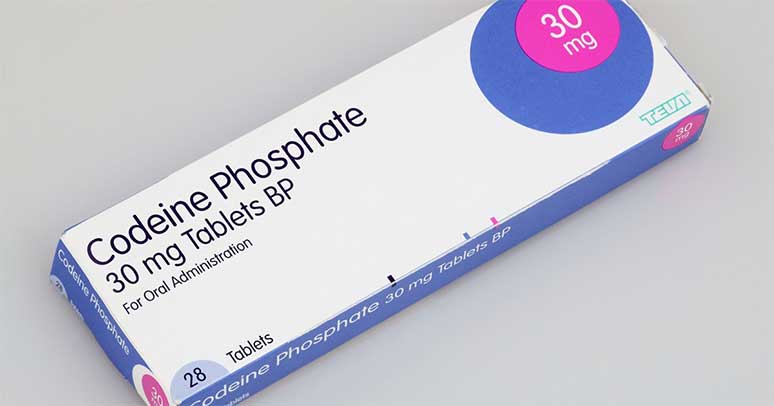Codeine Dosage Guide | 15 mg to 60 mg

Written by: Dr Jason Martin Psy.D., LCPC
Proper use of codeine is following a prescription from a licensed medical professional who’s evaluated your situation. Codeine abuse is using the drug in any way other than prescribed, which raises the risk of side effects, overdose, and addiction.

Codeine is an opioid analgesic (painkiller) and antitussive (cough suppressant). A healthcare professional may prescribe codeine for mild to moderate pain relief, a severe cough, or postoperative pain.
Though codeine is milder than other opioids, such as oxycodone (OxyContin) and hydrocodone (Vicodin), people still abuse it and can become addicted. Follow your doctor’s prescription, and do not adjust your dosage without medical guidance.
Codeine Dosage: Proper Use
Codeine comes as a tablet, capsule, or oral solution. You may get codeine by itself (codeine sulfate) or in a combination product (codeine phosphate). The drug is commonly combined with an over-the-counter pain reliever, such as acetaminophen (Tylenol 3).
Tablet Dosage
The starting dose of codeine is a 15 to 60 mg tablet every four hours as needed and no more than 360 mg in 24 hours. Research shows that a dose higher than 60 mg is not beneficial and may be harmful.
Oral Solution Dosage
The dosage for codeine oral solution starts at 15 mL every four hours as needed. Use the measuring cup that comes with the prescribed bottle. Household spoons are inaccurate or easily confused, which could lead to an overdose or not taking enough to be effective.
Dosing Process
Your doctor should prescribe the lowest effective dose of codeine for the shortest possible time, only increasing it if it’s not working. They should monitor you closely, especially during the first 24 to 72 hours, in case you have severe respiratory depression (difficulty breathing).
When it’s time to stop using codeine, your doctor may help you wean off it. Stopping suddenly can cause withdrawal symptoms, which are more likely and more severe the higher your dosage of codeine.
Codeine Drug Interactions & Risks
Codeine can interact with some drugs and should not be used in people with certain medical conditions. It’s important to have a prescription and be honest with your doctor to avoid unnecessary complications.
It can affect your doctor’s decision to prescribe codeine if you:
- are breastfeeding
- are using supplements
- are taking antidepressants
- have had a head injury
- have low blood pressure
- have pancreatitis (inflamed pancreas)
- have a hepatic disease (liver disease)
- have paralytic ileus (a condition in which food cannot pass through the intestines)
Since codeine is a Schedule II controlled substance, it’s not a drug that’s prescribed lightly. Your doctor will ensure you understand the risks associated with the use of opioids and determine if codeine is the best option for you before prescribing it.
Codeine Abuse
Codeine abuse is using the drug in any way other than prescribed. That can mean taking a higher dose, using it more frequently, or staying on it for a longer duration.
It may also mean crushing codeine tablets and snorting them or injecting the oral solution. While uncommon, these methods of abuse take the drug into the brain and bloodstream quicker and have a more intense effect.
Codeine targets opioid receptors to interrupt brain messages that cause you to feel pain. Instead, it can produce a pleasant sensation of relaxation and euphoria in high doses.
These effects make it attractive for substance abuse but encourage addiction and physical dependence.
Typically, codeine is only prescribed for short-term use. It’s occasionally used for chronic pain management but should be monitored closely. Long-term codeine abuse is dangerous. Drug abuse increases the likelihood of adverse effects, overdose, and health problems.
Side Effects Of Codeine
You may have side effects with codeine even if you take it as prescribed, but abusing the drug puts you at an increased risk. The more of a drug you have in your body, the more it interferes with natural bodily function.
Side effects of codeine may include:
- dizziness
- lightheadedness
- sleepiness
- sedation
- shortness of breath
- sweating
- headache
- constipation
- stomach pain
- nausea
- vomiting
- difficulty urinating
Some people have serious side effects with codeine, such as:
- severe itching (pruritus)
- rash or hives
- vision changes
- loud or shallow breathing
- difficulty breathing
- changes in sexual desire or ability
- changes in heart rate
- seizures
- agitation
- hallucinations
- loss of coordination
- confusion
- loss of appetite
If you experience adverse reactions to codeine that are persistent or severe, talk to your doctor right away.
Codeine Overdose Risk
You can overdose on codeine if you take a high dose or repeated overlapping doses. If you have more of the drug in your system than your body can handle, it will react adversely.
The risk of overdose increases if you mix codeine with another central nervous system (CNS) depressants, such as alcohol, benzodiazepines, or other opioids. Combining depressants can slow your breathing and heart rate too much, causing life-threatening respiratory depression.
Symptoms of a codeine overdose may be:
- slow, shallow, or stopped breathing
- very slow heartbeat
- cold and clammy skin
- blue nails and lips
- intense drowsiness
- extreme dizziness
- unresponsiveness
- loss of consciousness
- coma
A codeine overdose can kill you. If you’re using codeine—whether you’re abusing it or taking it as prescribed—you should have naloxone on hand. Naloxone (Narcan) is an opioid overdose reversal agent that temporarily blocks the effects of opioids.
If you suspect someone has overdosed, or if someone suspects that you have, naloxone can buy you time to get medical help. It can save your life.
Long-Term Effects Of Codeine Abuse
Chronic use of codeine is linked to severe constipation, sexual dysfunction, fatigue, and depression. Respiratory depression that comes from high doses of codeine restricts oxygen flow to the brain, which can cause permanent brain damage, especially if you’ve overdosed.
Abusing codeine with acetaminophen can lead to liver damage, as acetaminophen is hard on the liver and shouldn’t be taken long-term or regularly.
Codeine abuse changes your brain structure so you start to crave the drug. Your body also gets used to having codeine. Addiction and physical dependence usually go hand-in-hand.
If you’re dependent on codeine and suddenly stop taking it or reduce your dosage significantly, you’re likely to have withdrawal symptoms, such as:
- restlessness
- irritability
- anxiety
- insomnia (difficulty sleeping)
- sweating
- teary eyes
- runny nose
- fast breathing
- fast heart rate
- loss of appetite
- nausea
- vomiting
- diarrhea
- muscle aches
If you or a loved one are abusing codeine, now is the time to get help. At Ohio Recovery Center, we offer personalized codeine rehab programs that meet you where you are and give you the tools for lasting recovery. Speak with a treatment specialist today to learn more.
- Drug Enforcement Administration — Controlled Substances https://www.deadiversion.usdoj.gov/schedules/orangebook/c_cs_alpha.pdf
- National Institute of Health — Codeine https://www.ncbi.nlm.nih.gov/books/NBK526029/
- National Institute of Health — Long-term codeine use is associated with depressive symptoms https://pubmed.ncbi.nlm.nih.gov/10440467/
- National Library of Medicine: DailyMed — Label: acetaminophen and codeine phosphate solution https://dailymed.nlm.nih.gov/dailymed/drugInfo.cfm?setid=83a536d8-385d-46ed-9cd2-47b7efe96ccf
- National Library of Medicine: DailyMed — Label: codeine sulfate tablet https://dailymed.nlm.nih.gov/dailymed/drugInfo.cfm?setid=010905f9-3bcb-4b50-9fe8-a3ad0010f14c
- National Library of Medicine: Medline Plus — Codeine https://medlineplus.gov/druginfo/meds/a682065.html

